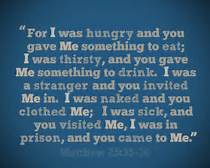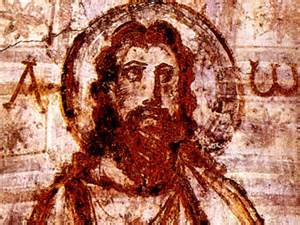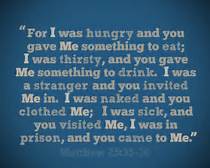“The Least of These”

Matthew 25:37-40 (25:37) – November 22, 2020
As you and I have been living through these past months of upheaval, uncertainty and pandemic, it might seem like the end of the world is quickly approaching. Does it seem like that to you? Perhaps our Lord Jesus will come very soon, as a king on His throne. (If He does, amen!)
This parable is from the last sermon that Jesus preaches, in the middle of the Passion Week. Jesus knows His time is very short. I suspect He is really impatient with His followers. So, Jesus talks straight – as straight to His friends as ever He could. Many people think these words of Jesus are harsh. God is going to judge humanity like a mean taskmaster or stern overlord. At least, that is what we might think if we look at a surface view.
Let’s set the stage. In this parable, we have a king on his throne, at the end of all things. At the end of ages. Many people are powerfully fearful of the mighty king on his throne, and consider this the eternal judgement at the end of all things.
These words of Jesus do not tell us that the biggest thing in the world is to give away tens of thousands of dollars. Or, to make sure each of us writes our important name in the pages of history. No! Jesus tells us no such thing! What does Jesus really want us to do, anyhow?
Amazingly enough, Jesus does not demand His followers to do anything especially mighty, or courageous, or daring. No! Instead, Jesus mentions simple things. Helpful, straightforward things. Things just about anyone can do. Can you give a hungry person a meal, or a thirsty person a drink? Can you welcome the stranger – any stranger, no matter who? What about cheering the sick or visiting the prisoner in jail?
Jesus talks about giving simple help to the people we might meet every day. People on street corners, or shaking a cup downtown. Neighbors hiding in their cold, dark apartments or weary from searching for work. Friends suffering from food insecurity, living in food or medical deserts in the inner city, or a new refugee family settling here, from a war-torn country far away.
About 20 years ago, I attended a larger church in a nearby suburb. This church had a ministry to take children of incarcerated women to visit their moms in prison, downstate. Since I have a commercial driver’s license, I started driving the church bus to transport the children and their adult relatives. Grandmas, aunties, sometimes grandpas. These extended families had very little money, and it was almost impossible for these children to see their moms unless they had some help – like from this church, sending the church bus downstate nine or ten times a year.
I drove these children for many hours on Saturdays to see their moms. I considered it one of the most worthwhile ministries that I have ever been involved with. Ever.
Commentator David Lose asks the penetrating question: “in this time of isolation and division and unrest and wondering how we’re going to get by and whether there’s anything we can do… might we during all this remind our people of the promise – and it is a promise – that Jesus is really and truly available to us in the real and concrete needs of those around us and that God takes all of this so very seriously, blessing our efforts and meeting our deepest needs when we reach out to those who are struggling.” [1]
“What our Gospel writer is proposing here should not be understood as some kind of works righteousness. These are works of neighbourly love done – or not done – not with the intention of putting oneself right with God, or earning God’s favour, but done – or not done – because of the person’s fundamental attitude towards the world. They are, in the language of Reformation theology, not works intended to earn justification, but the fruits of justification, the outpouring of the believer’s love of God.” [2]
This is Jesus, telling us to do acts of neighborly love – often! And, reminding us that it is our internal attitude, the inside part, that is truly important before God.
To those with ears to hear, let them hear!
May we join in the prayer of Teresa of Avila (1515-82):“Christ has no body on earth now but yours, no hands but yours, no feet but yours; yours are the eyes through which he looks with compassion on the world; yours are the feet with which he walks to do good; yours are the hands with which he blesses all the world.”
No matter where they were born, no matter what faith tradition they follow, no matter what side of the tracks these friends happened to be born on, these diverse, multi-racial, multi-ethnic brothers and sisters have already been welcomed by God. Can we do any less?
May we find joy in offering a cup of cold water to anyone who is thirsty, visiting those in prison, extending a hand to those who need it, always doing what we can for “the least of these,” our true brothers and sisters in Christ. Alleluia, amen!
[1] http://www.davidlose.net/2020/11/christ-the-king-a-the-third-sacrament/?utm_source=feedburner&utm_medium=email&utm_campaign=Feed%3A+davidlose%2FIsqE+%28…In+the+Meantime%29
[2] https://www.churchofscotland.org.uk/__data/assets/pdf_file/0012/71202/22-November_Christ-the-King-V2.pdf
(Suggestion: visit me at my regular blog for 2020: matterofprayer: A Year of Everyday Prayers. #PursuePEACE – and my other blog, A Year of Being Kind . Thanks!


